“Seebee, seebee, tilgi gheira, 5ali,” Amy Roko raps to me. We’re sat in my car driving to the first location of her cover shoot, the same day that her debut single, Seebee, has just dropped on Arabic streaming platform Anghami. “Seebee, seebee rou7i rou7i, 5ali”, she continues.
Comedienne, rapper, and beauty maven. Amy Roko took her short comedy sketches to Vine in 2015 and quickly amassed a following of millions. Now, the Saudi influencer (who goes by her online pseudonym) is the Creative Director of Insomnia Records, has a myriad makeup campaigns under her belt, and can, as of our cover-shoot-day, officially identity as a professional musician. She also boasts an eponymous fashion label that consists of colourful hoodies: a symbol of youthful joy and expression.
Amy is a beautiful statement of what it means to both be a Gen-Z world citizen and someone who observes aspects of Muslim and Arab tradition. She unabashedly shuns the stereotypes put upon her and has brushed-off with ease what others think about one of the most controversial pieces of clothing out there: the niqab. No other item of religious apparel has ignited passions and prejudice among both the Western world and keyboard warriors alike.
Shirt, jacket and trousers by Autonomie. Scarf: stylist’s own.
Legislation prohibiting various face veilings, from the hijab to the burqa, now exists in Belgium, Bulgaria, Austria, France, and Germany. The law, punishable by a fine, only affects Muslim women. Many think modesty is a must, the niqab non-negotiable, but Amy, now 29, chose to start wearing her niqab in her early 20s. Seeing it as a sign of reaching adulthood, she “couldn’t wait” and felt like she was finally able to follow in her mother’s footsteps.
It may seem like an unlikely totem to grace the feeds of a social media influencer with millions of followers, particularly on an app like Instagram that’s known for bare-it-all selfies, but the niqab is a visible boundary in a world where there are few. And her story has clearly resonated with women from outside of her cultural beliefs, too.
Hadeel Marei, fellow influencer and Amy Roko’s bestie, joins us on set. The way the two pals interact is a treat to witness. They have a finish-each-others-sentences kind of friendship, teasing one another and often giving into touchy-feely heartfelt moments. They are one another’s coconspirators. Plotters. Schemers. Copilots. Ask Batman and Robin, Chandler and Joey, or Romy and Michele. Everything, to some extent, seems easier with a sidekick. Or at the very least, a lot funnier.
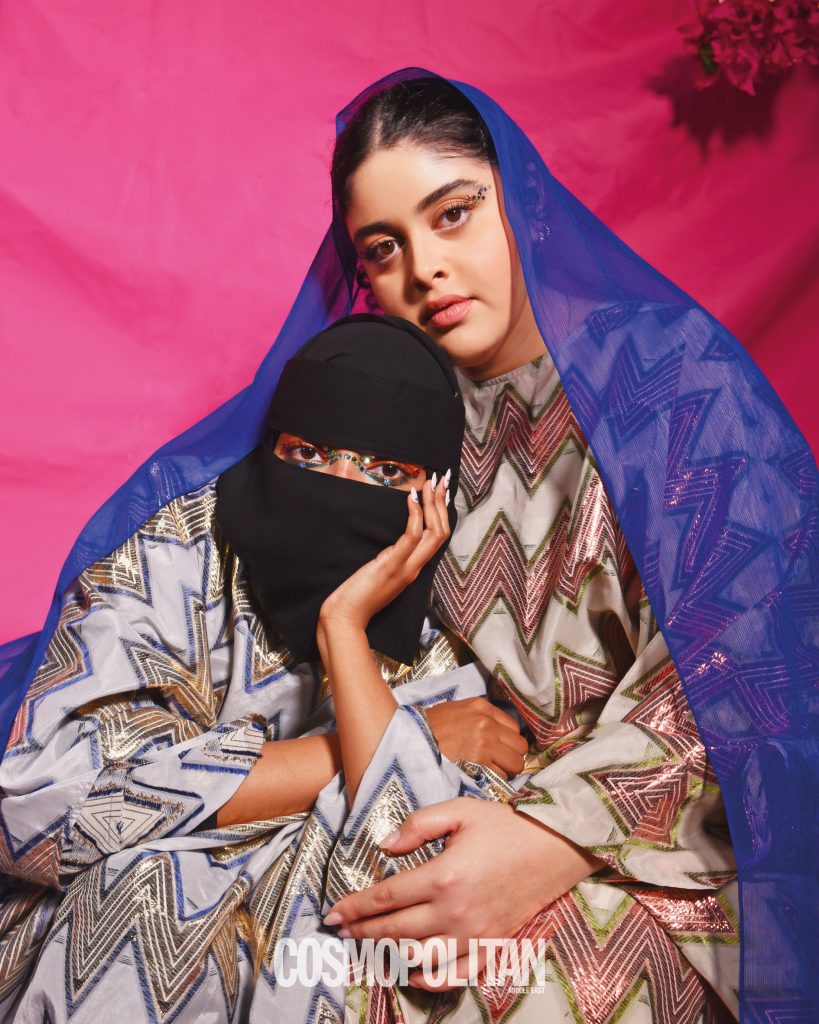
Amy Roko wears a kaftan by Dima Ayad, headpiece: stylist’s own, mask: stylist’s own. Hadeel Marei wears a kaftan by Dima Ayad.
We sit down for our hour-long chat, where the sibling-like duo begin to interview each other for our cover story, putting them in full control of their own narrative. By the end of the night, one thing for sure is true: nothing beats friendship – even a friendship forged in the fickle flames of the influencer industry.
Hadeel: When did we first meet? It was after an event, right? It was very brief and very quick, but then during Covid, we Zoomed nearly every day, like, hours upon hours.
Amy: And sometimes you wouldn’t even talk, we’d just exist in each other’s company.
H: That’s when we got to really know each other, like the details of each other’s lives. Amy was in Saudi and I was in Dubai, but we’d have conversations that range from the weather to the deepest taboos, like ‘what are you looking for in life?’
A: My first impression of you was that you impressed me. Usually, when I meet influencers, there’s a barrier. They put up a front to maintain their image. But when I first met you at that Huda Beauty event, and I was wearing a gold wig and you were filming me and shouting, “Girl! Flex! Slay!”
H: I don’t really have first impressions of people, because it’s not fair to them if you’ve caught them on a bad day, but I did know of you before I met you. I just knew that Amy is iconic. I loved what she was doing with comedy because she would just put the darkest thoughts and most subliminal messages out there and put a funny spin on it. My community on social media is super supportive as well.
A: Mine aren’t! I get so many comments about the way I dress, the way to do my makeup, the way I have nail polish on, and how that means I can’t pray. I don’t respond anymore, though. I’ve reached a point in life where I don’t feel like I owe anyone an answer.
H: You don’t have to justify every single behaviour that you do online.
A: It’s like how I stopped explaining my niqab to people a long time ago. Explaining it only makes it worse! If I say “I wear it because I like it”, then I’m met with the response, “so it’s not religious?” And I’m like, “Well, yes it kind of is,” and then they jump to conclusions right away. So now I just let people think whatever they want.
H: It’s different when you’re explaining it to someone who genuinely wants to understand, versus someone who just wants to argue and prove you wrong.
A: Exactly. Even in the Quran, there’s a verse that says “Lakum deenukum wa liya deen”, meaning: you have your religion and I have mine. It addresses how we’re all different from each other, but we don’t need to oppose anything on each other.
Hadeel: Live and let live.
A: That’s why it was nice to work with a full Arab team on this cover shoot. There wasn’t much of a culture shock for anyone when it came to picking outfits or styling up a set. I don’t get a barrage of questions, it’s actually just comfortable. Sometimes I have to go to shoots and explain myself.
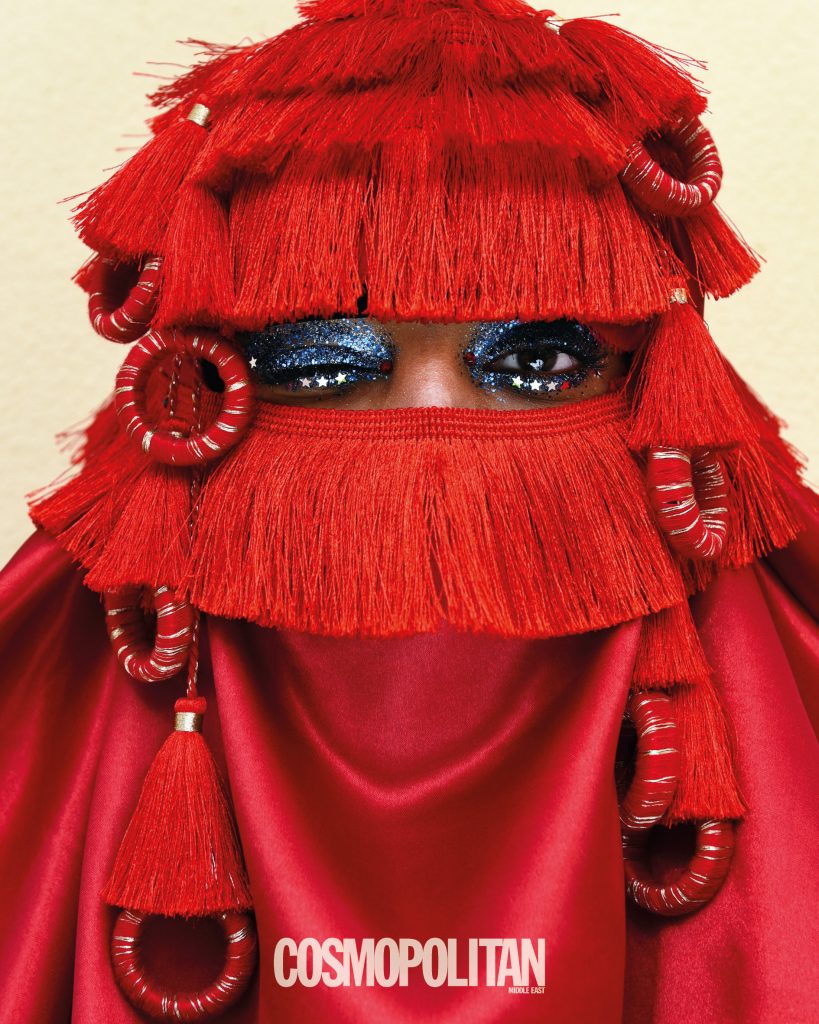
Abaya and headscarf: stylist’s own.
Hadeel: It’s important to respect someone else’s privacy.
A: Did you ever want to be famous? I’m asking because I already know my answer: I didn’t. I have panic attacks and am a very introverted person. You know how I could go for months just staying at home not doing anything. Dealing with people was sometimes too much and they would drain my battery, so I never wanted to work in an industry where I had to deal with a lot of people – but here we are!
H: You’ve done the opposite. You’re in an industry where the whole world can see you.
A: Exactly.
H: When I was a kid, I was always a chubby kid, so people would always stare at me. But at such a young age, like five or six years old, I thought people were staring at me because I was famous and they loved me, so I just smiled back. Now, though, I’ve turned off Instagram’s feature where you can see the number of likes on a post so that I don’t obsess over the numbers.
A: How did you get into social media?
H: I would always watch YouTubers like Tyler Oakley, Jenna Marbles, Jaclyn Hill, Shane Dawson, and people like that. I would be like, “Wow! Look at them. They’re just opening a camera and being so direct.” I loved it, but I didn’t see myself in it. Then a friend of mine, Maha Jaafar, started creating content, and she eventually convinced me to start. I still feel like there is definitely a lack of content in the Arab world – written and verbal. We still aren’t ‘there’ yet in terms of representation.
A: When I was younger, I never liked TV. It always seemed so fake to me, and the only thing I actually liked was the news. They were telling us what’s up, they were giving us the tea and I loved that.
So when I was in eighth grade, I told my mum I wanted to go on TV. She called up the station and told them her amazing, super funny daughter wanted to join one of their segments, but eventually when they found out that I cover my face they straight up said no. He told my mum that pretty girls don’t cover-up, and she subsequently had to tell me that I couldn’t go on TV. Now I have amassed this huge social media following, it’s like a big F you to that producer.
H: Your mum wears the niqab as well.
Amy: Yes. My parents didn’t really like it at first when I first started wearing the niqab because it’s what adults do, so my dad thought that it made us look like women. I used to watch my mum get ready, she would put an abaya on and then cover herself and leave the house. I was like, listen, I want to get some of that! I couldn’t wait to grow up and dress like her, I thought it was the coolest thing ever. I started wearing it on and off when I was about 18-years-old, then I fully committed when I was 20-something.
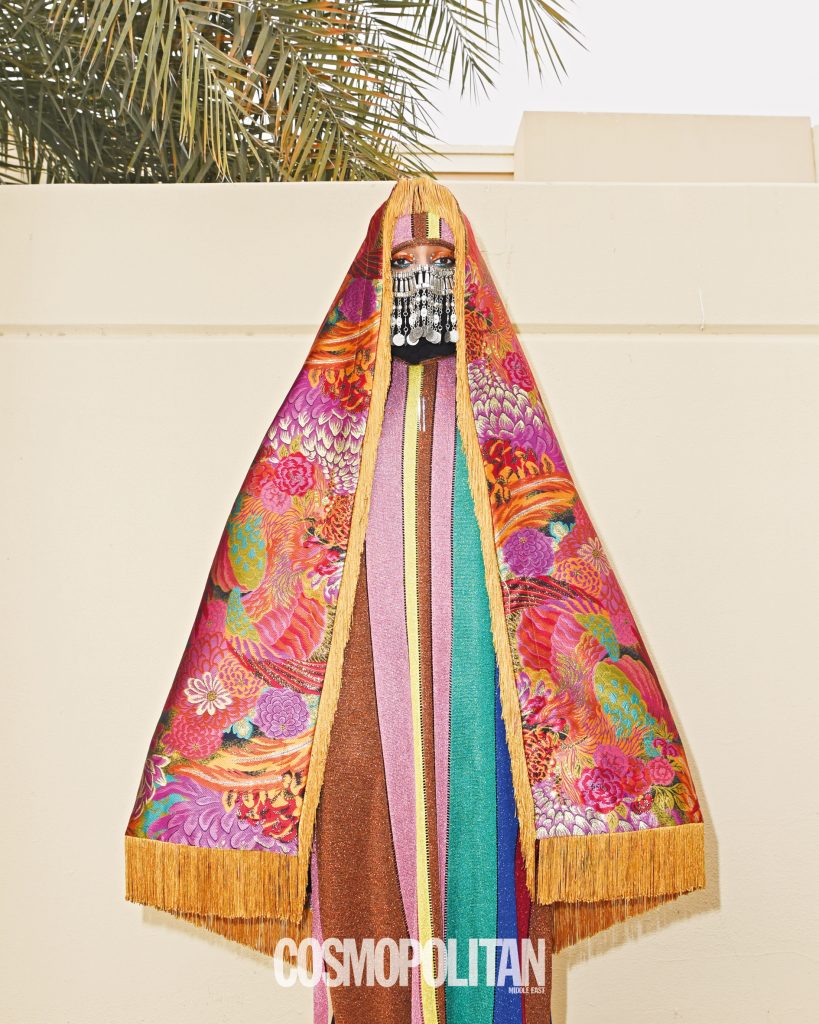
Dress by Marina Rinaldi, dress worn as sheila by Taller Marmo, niqab jewellery: stylist’s own.
H: What is the most difficult thing a person has said to you in real-life about the way you dress?
A: At Arab Fashion Week, just a few weeks ago, I was all dressed up, flexing, bringing my A-game, looking fancy – I mean, it’s Fashion Week, after all – and this man started asking me: why are you dressed like this? Do you sleep like this? Do you live at home like this? He was talking about my niqab. He was dressed like a Kanye West wannabe, so we just laughed it off and ignored him.
H: Uncaaaht Jahmz.
A: Uncaaht Jahmz!
H: That feeling when celebrities start trending for wearing black headscarves and they’re not Arab at all…
A: It’s horrendous. It’s horrible.
H: It’s hypocrisy in its purest form.
A: It sucks. When Kim Kardashian wore that full black look at the Met Gala, I was like, what is this? At least I show my eyes! People collectively put all Arabs together, but we’re all raised in different countries – North Africa, Saudi, the UAE – and we all have different points of few. People use the words “Arab” like we’re one thing. But you know how we educate them? Comedy.
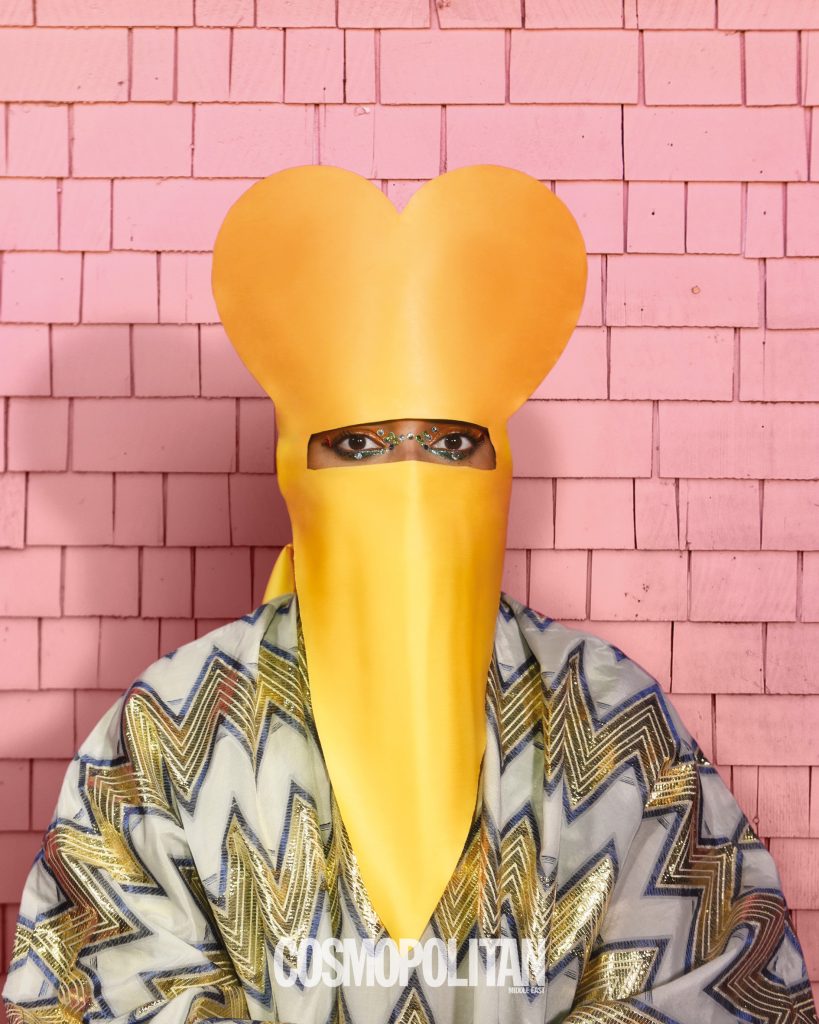
Dress by Dima Ayad, headpiece: stylist’s own.
H: Just show up. You have to know where the line is, though. I hope one day I can go beyond social media and get into film and TV.
A: You like the writing part as well.
H: Yes! When I watch a show, I obsess! Who’s the writer? How did he write it? What cameras did they use? Why did they go for that lighting? How is the casting process? I obsess over all of these things. We have so many stories to tell that are not shown on TV. They are just about love, classism, or inheritance.
Amy: Our boring Arab topics.
H: No, because that’s the comfort zone! That’s what people are used to. They see that this model works. So, they just stick with it. They’re scared to branch out into something new. We should do a podcast together.
A: We will! And we’re doing a song together. My first song just dropped today, it’s called Seebee, which means leave him sis.
H: Let him go, girl!
Amy: What I’m saying is that every song that I write is not going to be related to love. That’s for sure. They’re just going to be about –
Hadeel: Women understanding their values.
A: Exactly.
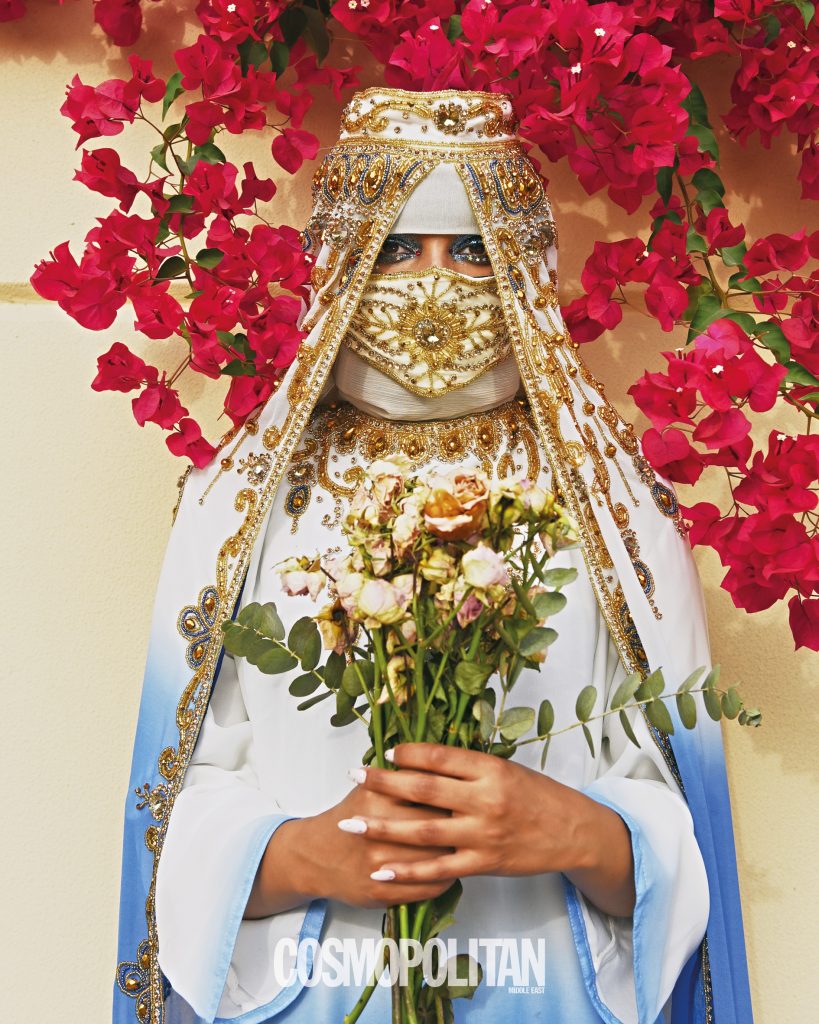
Abaya, headpiece, sheila, mask: stylist’s own.
Words by Milli Midwood
Photography by Mous Lamrabat
Styling by Nour Bou Ezz, Assistant styling by Hajjar Zaidan
Producer: Natascha Hawke
Local producer and Photographer agent: Saufeeya
Makeup by Gulum Erzincan
Nails by Tips & Toes
Props by Propped Up Rentals
Assistant styling: Hajir Zaidan
Video Producer: Rouhana El Hage
Digital Editor: Sara AlHumiri, Content Producer: Twinkle Stanly

